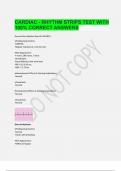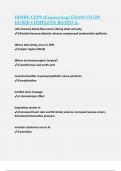Carotid sinus massage - Study guides, Class notes & Summaries
Looking for the best study guides, study notes and summaries about Carotid sinus massage? On this page you'll find 522 study documents about Carotid sinus massage.
Page 3 out of 522 results
Sort by
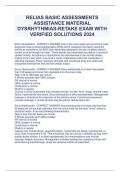
-
RELIAS BASIC ASSESSMENTS ASSISTANCE MATERIAL DYSRHYTHMIAS-RETAKE EXAM WITH VERIFIED SOLUTIONS 2024
- Exam (elaborations) • 5 pages • 2023
- Available in package deal
-
- $11.49
- + learn more
EKG interpretation - CORRECT ANSWER-One of the most useful and commonly used diagnostic tools is electrocardiography (EKG) which measures the heart's electrical activity as waveforms. An EKG uses electrodes attached to the skin to detect electric current moving through the heart. These signals are transmitted to produce a record of cardiac activity. Arrhythmia or dysrhythmia are disturbances in the normal cardiac rhythm of the heart which occurs as a result of alterations within the c...
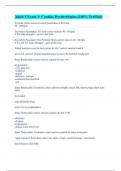
-
Adult 3 Exam 1: Cardiac Dysrhythmias (100% Verified)
- Exam (elaborations) • 8 pages • 2024
- Available in package deal
-
- $10.39
- + learn more
SA node correct answers normal pacemaker of the heart 60 - 100 bpm Secondary Pacemaker: AV node correct answers 40 - 60 bpm if SA node struggles -- goes to this beat Secondary Pacemaker: His-Purkinje Fibers correct answers 20 - 40 bpm if SA and AV nodes struggle -- goes to this beat Which lead gives you the best picture & why? correct answers Lead II gives you a picture of atrial depolarization (p-wave) & electrical conduction Sinus Bradycardia correct answers regular but rate ...
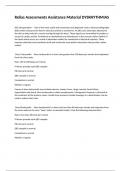
-
Relias Assessments Assistance Material DYSRHYTHMIAS
- Other • 6 pages • 2023
- Available in package deal
-
- $4.89
- 1x sold
- + learn more
EKG interpretation - One of the most useful and commonly used diagnostic tools is electrocardiography (EKG) which measures the heart's electrical activity as waveforms. An EKG uses electrodes attached to the skin to detect electric current moving through the heart. These signals are transmitted to produce a record of cardiac activity. Arrhythmia or dysrhythmia are disturbances in the normal cardiac rhythm of the heart which occurs as a result of alterations within the conduction of electrical...
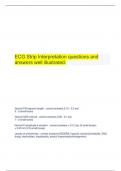
-
ECG Strip Interpretation questions and answers well illustrated.
- Exam (elaborations) • 39 pages • 2023
-
- $10.49
- + learn more
ECG Strip Interpretation questions and answers well illustrated. Normal PR segment length - correct answers.0.12 - 0.2 sec 3 - 5 small boxes Normal QRS interval - correct answers.0.06 - 0.1 sec 1 - 3 small boxes Normal P amplitude & duration - correct answers.< 0.12 sec (3 small boxes) < 0.25 mV (2.5 small boxes) causes of arrhythmias - correct answers.HISDEBS: hypoxia, ischemia/irritability, SNS, drugs, electrolytes, bradycardia, stretch (hypertr...
IBHRE CEPS (Engineering) EXAM STUDY GUIDE COMPLETE RATED A.
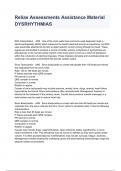
-
Relias Assessments Assistance Material DYSRHYTHMIAS Questions And Answers
- Exam (elaborations) • 5 pages • 2023
- Available in package deal
-
- $9.99
- + learn more
Relias Assessments Assistance Material DYSRHYTHMIAS Questions And Answers EKG interpretation - ANS One of the most useful and commonly used diagnostic tools is electrocardiography (EKG) which measures the heart's electrical activity as waveforms. An EKG uses electrodes attached to the skin to detect electric current moving through the heart. These signals are transmitted to produce a record of cardiac activity. Arrhythmia or dysrhythmia are disturbances in the normal cardiac rhythm of the ...
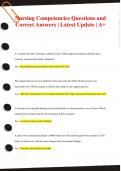
-
Nursing Competencies Questions and Correct Answers | Latest Update | A+
- Exam (elaborations) • 43 pages • 2024
-
- $14.19
- + learn more
A 1-month old baby is having a wellness exam. Which approach indicates that the nurse correctly measured the client's abdomen? Ans: Recorded the measurement to the nearest 1/4 inch The support person of a new pediatric client asks why the child's blood pressure was measured twice. Which response will the nurse make to the support person? Ans: The first measurement was to help determine how high to pump the blood pressure cuff A neonate receiving phototherapy is prescribed pulse ox meas...
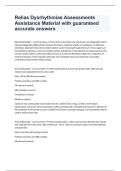
-
Relias Dysrhythmias Assessments Assistance Material with guaranteed accurate answers
- Exam (elaborations) • 6 pages • 2024
-
- $10.99
- + learn more
EKG interpretation - correct answer One of the most useful and commonly used diagnostic tools is electrocardiography (EKG) which measures the heart's electrical activity as waveforms. An EKG uses electrodes attached to the skin to detect electric current moving through the heart. These signals are transmitted to produce a record of cardiac activity. Arrhythmia or dysrhythmia are disturbances in the normal cardiac rhythm of the heart which occurs as a result of alterations within the conduction ...
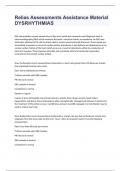
-
Relias Assessments Assistance Material DYSRHYTHMIAS exam 2023 with 100% correct answers
- Exam (elaborations) • 6 pages • 2023
-
- $13.99
- + learn more
EKG interpretation correct answersOne of the most useful and commonly used diagnostic tools is electrocardiography (EKG) which measures the heart's electrical activity as waveforms. An EKG uses electrodes attached to the skin to detect electric current moving through the heart. These signals are transmitted to produce a record of cardiac activity. Arrhythmia or dysrhythmia are disturbances in the normal cardiac rhythm of the heart which occurs as a result of alterations within the conduction of...

How much did you already spend on Stuvia? Imagine there are plenty more of you out there paying for study notes, but this time YOU are the seller. Ka-ching! Discover all about earning on Stuvia

